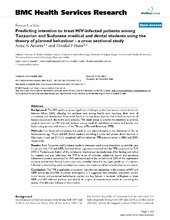| dc.contributor.author | Åstrøm, Anne Nordrehaug | en_US |
| dc.contributor.author | Nasir, Elwalid Fadul | en_US |
| dc.date.accessioned | 2015-01-27T15:23:37Z | |
| dc.date.available | 2015-01-27T15:23:37Z | |
| dc.date.issued | 2009-11-20 | eng |
| dc.identifier.issn | 1472-6963 | |
| dc.identifier.uri | https://hdl.handle.net/1956/9294 | |
| dc.description.abstract | Background: The HIV epidemic poses significant challenges to the low income countries in sub Saharan Africa (SSA), affecting the attrition rate among health care workers, their level of motivation, and absenteeism from work. Little is known about how to deal with deterioration of human resources in the health care systems. This study aimed to predict the intention to provide surgical treatment to HIV infected patients among medical- and dental students in Tanzania and Sudan using an extended version of the Theory of Planned Behaviour (TPB). Methods: Four hundred and seventy five medical- and dental students at the University of Dar es Salaam (mean age, 25 yr) and 642 dental students attending 6 public and private dental faculties in Khartoum (mean age 21.7 yr) completed self-administered TPB questionnaires in 2005 and 2007, respectively. Results: Both Tanzanian and Sudanese students demonstrated strong intentions to provide care for people with HIV and AIDS. Stepwise linear regression revealed that the TPB accounted for 51% (43% in Tanzania and Sudan) of the variance in intention across study sites. After having controlled for country and past behaviour, the TPB in terms of attitudes, subjective norms and perceived behavioural control accounted for 34% and moral norms for an additional 2,3% of the explainable variance in intention. Across both study sites, attitudes were the strongest predictor of intention followed in descending order by subjective norms, moral norms and perceived behavioural control. Conclusion: The TPB is applicable to students' care delivery intentions in the context of HIV and AIDS across the two SSA countries investigated. It is suggested that attitudes, subjective norms, moral norms and perceived behavioural control are key factors in students' willingness to treat AIDS and HIV infected patients and should be targets of interventions aimed at improving the quality of health care delivery in this context. | en_US |
| dc.language.iso | eng | eng |
| dc.publisher | BioMed Central | eng |
| dc.relation.ispartof | <a href="http://hdl.handle.net/1956/15222" target="_blank">Aspects of Oral Health Care Services in the context of HIV and AIDS in the Sudan</a> | |
| dc.rights | Attribution CC BY | eng |
| dc.rights.uri | http://creativecommons.org/licenses/by/2.0 | eng |
| dc.title | Predicting intention to treat HIV-infected patients among Tanzanian and Sudanese medical and dental students using the theory of planned behaviour - a cross sectional study | en_US |
| dc.type | Peer reviewed | |
| dc.type | Journal article | |
| dc.date.updated | 2013-08-28T16:39:17Z | |
| dc.description.version | publishedVersion | en_US |
| dc.rights.holder | Anne N Åstrøm et al.; licensee BioMed Central Ltd. | |
| dc.rights.holder | Copyright 2009 Åstrøm and Nasir; licensee BioMed Central Ltd | |
| dc.source.articlenumber | 213 | |
| dc.identifier.doi | https://doi.org/10.1186/1472-6963-9-213 | |
| dc.identifier.cristin | 346357 | |
| dc.source.journal | BMC Health Services Research | |
| dc.source.40 | 9 | |

